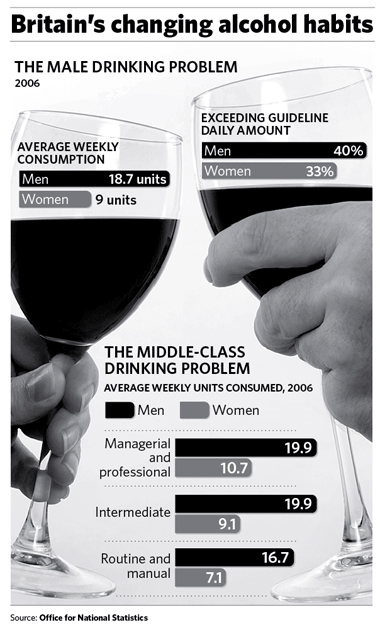The more successful you are, the more you drink, research finds

Your support helps us to tell the story
From reproductive rights to climate change to Big Tech, The Independent is on the ground when the story is developing. Whether it's investigating the financials of Elon Musk's pro-Trump PAC or producing our latest documentary, 'The A Word', which shines a light on the American women fighting for reproductive rights, we know how important it is to parse out the facts from the messaging.
At such a critical moment in US history, we need reporters on the ground. Your donation allows us to keep sending journalists to speak to both sides of the story.
The Independent is trusted by Americans across the entire political spectrum. And unlike many other quality news outlets, we choose not to lock Americans out of our reporting and analysis with paywalls. We believe quality journalism should be available to everyone, paid for by those who can afford it.
Your support makes all the difference.Chief executives of big companies and public sector organisations are coping with their stressful positions by drinking the equivalent of almost three bottles of wine a week, new research shows.
Men holding the highest positions drink an average of almost 23 units a week – more than 11 medium (175ml) glasses of wine.
Their consumption exceeds the total recommended weekly limit for alcohol of 21 units and suggests many businessmen and managers may suffer ill health as a result.
Doctors, lawyers, accountants and other professional men are also knocking back above average amounts of alcohol – 20 units a week – according to figures from the Office of National Statistics (ONS) released yesterday.
Overall, they show that across all social classes about 10 million people are drinking more than the recommended weekly maximum of 21 units for a man and 14 for a woman.
Men are likely to drink twice as much as women. The ONS said it had previously underestimated the amount people were drinking and the real amount was 32 per cent higher. Men were drinking 18.7 units a week and a women nine units, compared with previous estimates of 14.8 and 6.2.
Previous studies have pointed to waning total alcohol consumption, but the researchers became concerned that they had not taken into account the trend for stronger beer and the serving of wine in larger glasses.
People may also be under-reporting or under-estimating consumption. In an attempt to discourage binge drinking, the Government advises women to drink no more than two units a day and men three units a day. A 175ml glass of wine counts as two units and a 250ml glass three units.
Four in 10 men and a third of women exceeded the daily limits at least once a week.
Home was the most popular place for people to drink, with half of the population having drunk there in the past week.
The English drink more than the Scots or Welsh, according to the two ONS reports, Smoking and Drinking Among Adults 2006 and Drinking: Adults Behaviour and Knowledge 2007. Almost a quarter of Britain's 42 million adults exceed the weekly limits. About 60 per cent of the population, 25 million adults, are low or moderate drinkers.
Almost six million people drink no alcohol and their inclusion in the drinking averages means that those who do drink alcohol drink even more than the figures suggest.
Eileen Goddard, the principal researcher, said that although statistics from the alcohol industry based on Customs data indicated that overall alcohol consumption had fallen by 5 per cent between 2004 and 2006, it was possible, given doubts over the research, that the total had actually gone up
Frank Soodeen, of Alcohol Concern, said: "Over the last 20 years middle-class families particularly have moved alcohol from the fringe of their lives to the centre of it. Because it so available they are drinking almost on a daily basis."
Jeremy Beadles, chief executive of the Wine and Spirit Trade Association, said he detected evidence that people were drinking more responsibly. "The message of responsible drinking is continuing to get out as the long-term trends continue to improve. It is also clear that the vast majority of people drink sensibly."
Join our commenting forum
Join thought-provoking conversations, follow other Independent readers and see their replies
Comments